- Home
- Rebecca Hagan Lee
Talk of the Ton Page 2
Talk of the Ton Read online
Page 2
Kerr narrowed his eyes. “You think less of me than I deserve.”
They’d been friends since Oxford, and yet Lockwood flinched slightly at the expression in Kerr’s eyes. “I merely thought—”
“I heard about your bet in White’s. You’ll lose that money, as you’ll lose any blunt you put into Hensing’s canal. I shall fulfill my obligations to Miss Loudan,” Kerr said, turning back to his sheet as if he had no further interest in the conversation.
A grin spread across Lockwood’s face. Kerr looked up and frowned. “What are you smirking about?”
“You just made up for Hensing’s canal. I placed a bet in White’s that you’d marry Mademoiselle Benoit, but that was only to give Etherege enough courage to take my bet on the other side . . . that you would honor your betrothal.”
“Etherege must have thought you were drunk,” Kerr observed. “Why the hell would you bet one way in White’s and place the opposite bet with him?”
“I gather he didn’t notice that the bet in White’s was for a shilling or two. He put a good four hundred pounds on your propensity to marry the mademoiselle, thinking I was too castaway to remember my own opinion.”
Kerr snorted. “Meet me at Miss Bridget’s tonight?”
Miss Bridget was a Frenchwoman who ran a house that was not precisely one of ill repute but damn near close, to Lockwood’s mind. “I see that your taste for Frenchwomen is much like the English taste for food: predicated on quantity rather than quality,” he remarked.
Kerr smiled faintly. “I thought it would amuse the ton to see me with a woman other than Madeline. We’ll take one of Miss Bridget’s young friends to the opera.”
Lockwood laughed. “That’ll put the cat amongst the pigeons.”
Kerr turned back to his papers. “Quite.”
Chapter Three
March 22, 1817
Mrs. Broughton to The Hon. Emma Loudan, St. Albans, Hertfordshire
Dear Miss Loudan,
Thank you so much for your gracious response to my letter; to be sure, I trembled before I took pen in hand. I should most dislike to be thought a gossipmonger, or some such, and yet I have every sympathy with your difficult position. I consider it my honor—if not my pleasure—to offer you such tidbits of news as might interest you. I hasten, then, to reassure you that it is no longer believed that the Earl of Kerr intends to marry Mademoiselle Benoit. Last night he and some friends made an appearance at the Royal Opera House accompanied by a group of young Frenchwomen. Everyone noted that Kerr paid particular attention to one of them, and since she cannot be considered a possibility for matrimony, the consensus is that your fiancé has a propensity for women of Gallic origin. This is a most unseemly topic, and I feel reprehensible for even bringing it to the attention of an unmarried lady. But my loyalty to Miss Proudfoot’s School rises above manners.
Yours with all esteem,
Mrs. Broughton
Emma Loudan, daughter of Viscount Howitt, was painstakingly painting bees, one after another. Bees, she thought to herself, are profoundly uninspiring insects: after one has painted one round yellow body and then another, one has learned all there is to know about bee painting. But there was no relief in sight: Titania and Bottom both mentioned bees in A Midsummer Night’s Dream, and Mr. Tey had decided that bees must swarm over every backdrop, and never mind that the audience would think the insects were flying marigolds. Emma sighed and dipped her brush into yellow paint.
She was just putting a finishing touch on one of three beehives when the door opened.
“Lady Flaskell,” announced the butler, Wilson.
Emma put down her brush just in time as Bethany hurdled herself across the room and threw her arms around Emma. “Careful!” she said, laughing. “You’ll get painted.”
“It’s quite all right. I’m wearing nothing but rags for the trip.”
Emma put her little sister at arm’s length and glanced from the saffron-colored flying ribbons on her glorious little bonnet to the tips of her silk slippers. “Rags are looking better every moment,” she observed, untying her voluminous apron.
Bethany’s eyes narrowed at the sight. “Your gown must have been created by Madame Maisonnat!” she cried. “The Duchess of Silverton was wearing just the same costume in sage green, only last week. Everyone was talking about it. How on earth did you obtain that gown here, in the depths of the country, and without coming to town?”
“I have my means,” Emma said, tucking a stray strand of hair behind her ear.
“What means are those?” Bethany demanded. “I could beg, plead, and cry at Madame’s door, and I’m quite certain that she would fulfill her other orders before mine.”
Emma glanced down at her morning gown. It was designed à la militaire, in amber-colored poplin with garnet buttons marching down the bodice. It followed her curves to a T and made her feel like an extremely feminine brigadier general. She smiled at her little sister. “It’s not a dark secret. Madame knows my measurements, and she simply sends me those gowns that she thinks would interest me.”
“Before anyone else?” Bethany said, her eyes narrowed.
Emma grinned. “I also pay her approximately twice the customary price, for her trouble. I must dress well in order to keep up my spirits here in the country.”
“Piffle! You could join me in London any moment you pleased. Mama’s death was well over a year ago now. The truth is that you like being immured in St. Albans, Emma.” Bethany walked over to the stage set, with its fresh paint and clusters of bees. “How can you prefer to sit about in the county and paint? Are those insects?”
“Bees. Obviously.”
“Proving my point absolutely. Painting insects while dressed in Madame Maisonnat’s latest creation! You’ve lost your wits.”
Put that way, Emma could see what she meant. “I like painting sets,” she said.
“That’s irrelevant,” Bethany said. “For once, you must take me seriously, Emma. You are in trouble.” She took a deep breath, her chest swelling impressively. “You are in danger of becoming an unmarried woman!”
“I’ve been an unmarried woman for four and twenty years,” Emma noted, opening the door. “Shall we retire to the morning room and have some tea? You must be fatigued after your journey.”
Bethany trotted through the door and down the hall, talking all the way and paying no attention to the presence of the family butler and two footmen. She finished up as she entered the morning room: “The point is that unmarried women are dreadfully out of fashion. If they ever were in fashion at all.”
“Wilson, will you bring us a tea tray?” Emma asked the butler.
“Immediately, Miss Loudan,” he said, bowing his way out of the morning room.
“You really mustn’t speak like that in front of Wilson,” Emma said, settling herself next to the fire. “When he is upset, he falls prey to stomachaches.”
Bethany plumped herself into the settee and turned her reticule upside down. “I cut a piece from a gossip column that you must read . . . ah! Here it is!” She waved a bit of newspaper in the air. “From La Belle Monde, and it says quite firmly that there is nothing more fatal to a woman than the lack of a husband. Listen to this: ‘Though they are the very ornament of their sex, they will await invitations that do not arrive. When they are invited to an occasion, one sees them flock to the side of the ballroom, like crows made dismal by rain.’ How awful, Emma! You do not look well in black.”
Emma was beginning to feel nettled. “I have a prospective husband,” she said coolly. “Simply because Kerr hasn’t yet presented himself to undergo the rite of matrimony doesn’t mean that he won’t do so in the near future. And besides, I firmly reject the implications of that piece of drivel. I could find another husband in five minutes, if I wished.”
“How long has it been since Kerr visited you?” Bethany demanded.
Emma hesitated.
Bethany answered for her. “He was coming last Christmas—No! It was two Christmases ago,
but then he traveled the Continent after his brother died. And before that—” She stopped, trying to remember.
“It’s been three years,” Emma said, feeling a mild astonishment at the fact. She was so comfortable living as she was that she tended to forget her fiancé’s existence. “I was so glad not to hear from him during Mama’s illness, since I had no wish to leave her, that I haven’t taken close account. But he has been in mourning for his brother, you know.”
“Mourning!” Bethany shrieked. “From all accounts, he took himself to Paris and enjoyed himself there so much that he had to fight at least two duels with outraged husbands. And the only reason he wasn’t challenged much more often was because he’s so skilled with the short sword. He told the Prince of Wales, in front of a large group, that he had drunk so much wine every night that he wouldn’t remember if he had had an affair with the Empress Josephine herself.”
Emma laughed. “A formidable amount of wine must have been called for to reach such a state.”
Bethany scowled at her. “A disgrace! That man is a disgrace! You are a disgrace to let him behave thus! He hasn’t even come here to apologize for those remarks of last week, has he? The churlishness of it! Obviously Kerr already sees you as a dismal crow on the side of the ballroom.”
“The truth is, Bethany, we hardly know each other. I doubt we’ve met more than three times. Well, four, if you count his brother’s funeral. Perhaps the man resents his father’s actions in kitting him up with an infant bride.”
Bethany snorted. “He shouldn’t be such a fool. It’s an excellent match, with nothing against it but his own lackluster character and your placid acceptance of his neglect.”
Emma felt her temper rising. “And just what do you propose that I should have done? I spent three years nursing Mama, as you well know. When she died, should I have rushed to London and tracked the man down like an errant child who has missed his supper?”
“Of course,” Bethany said. “Women must needs think of matrimony, because men have no inclination to it. What possible incentive has the man to bring himself to the altar? He doesn’t need your inheritance, he clearly feels no need for an heir, and he’s fully occupied by flirting with every woman with a French lisp and a glad eye!”
“Distasteful,” Emma said, pressing her lips together.
“All men are distasteful by nature,” Bethany said with a wave of her hand. “Women are only distasteful if they wither into old age without a husband at their side.”
“Marriage has made you unaccountably vulgar,” Emma observed.
Bethany raised her chin. “It’s my duty as your sister to call a spade a spade. I mean to speak to Father as well.”
Emma laughed shortly. “Good luck with that. He’s recently discovered that a flightless bird has been observed in the Galapagos Islands. I believe it’s a cassowary, or cas solary, or some such. He has hardly surfaced from his study in days, except for breakfast.”
Her little sister chewed her lip for a second. Then she said, “We can’t bicker over this, Emma. It’s too important.”
“I’m not worried about marriage. I have always had faith that Kerr would fulfill the terms of our engagement. I don’t know him well, but I would swear that he is an honorable man. In fact, I would guess that he is trying to drive me into terminating the arrangement as a sort of honorable escape.”
“Whether Kerr would eventually announce his intention to marry is irrelevant. His rudeness necessitates that you find a new spouse. You cannot marry a man who speaks of you in such terms and without even a hint of apology!”
Emma could see that her little sister was fairly pulsating with anxiety. “I shall not become an old maid,” she said cheerfully. “I’m not beyond my last prayers yet, you know.” She smiled over her teacup. “If you’re looking for an appealing display of modesty here, my dear, you won’t find it. I have avoided London from disinclination, never due to fear of the competition.”
“Well, I know that,” Bethany said, eyeing her sister. Emma didn’t look decayed, by any interpretation of the word. No crow ever had copper-colored hair swept into an elegant knot from which a few curls tumbled onto creamy shoulders. Even a little sister could see her eyes had an erotic tilt to them. “You’re too beautiful and funny to become an ape leader.”
“As I said, I’m not worried,” Emma said with a trace of impatience. “I’m disappointed that Kerr has made himself persona non grata, but if it’s a challenge to find a husband at my age, all the better! I’ve never been one to shrink from a contest, have I?”
“More the opposite,” Bethany said, thinking of how her elder sister loved to set herself a challenge, whether it was painting theatrical scenery (unheard of amongst gentle-women), or winning archery matches. “I just want you to marry well, come to London, and have some children,” she said. Her hand fluttered to her stomach.
Emma’s eyes narrowed. Was her little sister looking rather plumper than usual? Bethany plump, even though she would never even touch a dessert because plumpness was not in fashion?
“Bethany!” she cried, jumping up. “Darling, are you carrying a child?”
Her little sister blushed. “Well, perhaps . . .”
But even as a five-year-old in the nursery, Bethany had always displayed an alarming tenacity. It was only a moment or two later that she observed that the future arrival of her child was precisely the reason that her sister must marry immediately.
“I need you in London,” she said.
Emma looked at her narrowly. There was a hint of fear in her sister’s voice. “All right,” she said briskly. “I shall come to London and pick out a husband for myself. I doubt it will take a great deal of time. It’s a pity, because Kerr rather suited me. He left me alone, he’s handsome enough, and I like what I read of his speeches in Parliament. He seems intelligent.”
“You couldn’t,” Bethany said with a shudder. “After he said such an appalling thing about you!”
“You mean that I’m too old to bear a child?” Emma inquired.
“That wasn’t it. It was worse! I couldn’t even tell you.”
Emma fixed her with an elder sister’s glare. “Tell me.”
“He said that he wouldn’t take you as wife until you had his baby in your belly and his ring on your finger.”
There was a moment of silence.
“I shouldn’t have told you,” Bethany added morosely. “One is not supposed to discuss babies or bellies with unmarried ladies.”
“Don’t be a ninny,” her sister said absently. “Mrs. Mor rison in the village had her baby last week, by the way.”
“Oh, were you there? Is it a lovely babe?”
“Just like his father, if without the beard, but rather adorable nonetheless. Of course I was there. Dr. Placket arrived a half hour late, as usual, and stinking of gin. Do you really mean that Kerr said precisely that sentence, Bethany?”
“Or thereabouts.”
Emma laughed. “I said he was intelligent, didn’t I? Well-read it seems, as well.”
“Who cares for his brains? He’s intolerably rude to speak of you in such a fashion.”
“The man was quoting Shakespeare,” Emma said. “I can’t remember the exact quotation, but the line is from All’s Well That Ends Well. A perfectly loathsome specimen of manhood, the Comte de Rousillon, announces that he won’t accept his wife until she has the ring from his finger and his child to boot.”
“I never liked Shakespeare. The plays are so long and invariably lurid.”
“Don’t be such a philistine, darling,” Emma said with amusement.
“Why do you have that look about you?” Bethany demanded.
“I’m thinking. . . . Don’t you suppose that Kerr’s parents sent Father a ring at some point in the betrothal negotiations?”
“Negotiations?” Bethany repeated. “You mean, back when you were five years old?”
“Precisely.”
“Well, I can tell you that John’s family never sent me a rin
g. The only ring I received was the one he gave me when we married.”
“It seems to me that there was talk of a ring,” Emma said, puzzling over it. “I shall have to root Father out of his study and ask him.”
“Why does it matter?” Bethany asked. “You may have the ring, but you still don’t have the baby. And you can’t—” She caught sight of her sister’s face. “Oh, Emma, you can’t!”
“He’s challenged me,” Emma said with a grin, a diabolical, mischievous, laughing grin. “He’s thrown down the gauntlet, Bethany. You heard it yourself!”
“No, he didn’t mean that!”
“You said that I need to marry quickly.”
“But not—”
“And you said that I should have gone to London and forced him to marry me.”
“Yes but, Emma, I didn’t—”
“But darling, I’m just going to obey your express desires. I shall go up to London and force the man to marry me. I’ll go on my own terms—or rather, on his. Where is my Shakespeare?”
Chapter Four
March 22,1817
Lady Dyott to Miss Loudan, St. Albans, Hertfordshire
Dear Emma,
We bought the pony, and two other horses that caught Dyott’s fancy. I’m writing to urge you to come to London; no one is talking of Kerr’s impudent remarks anymore, and the season is well in force. The only subject on everyone’s lips is Lord Cavendish’s masquerade ball that he holds at Burlington House. Dyott and I attend as Caesar and his wife. I understand that Caesar’s wife was quite unexceptionable, although I have demanded that my gown cover rather more of my figure than was apparently common in the period. By all accounts Rome is warmer than London. I know you will likely stay with your sister, but we can mount you on a very nice mare. She has a good mouth and beautiful hocks. A touchy disposition, alas, but I never saw a mare that you couldn’t handle.

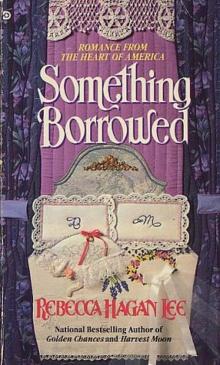 Something Borrowed
Something Borrowed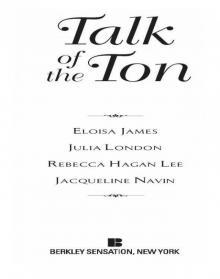 Talk of the Ton
Talk of the Ton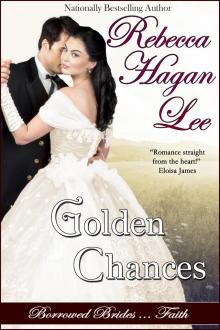 Golden Chances
Golden Chances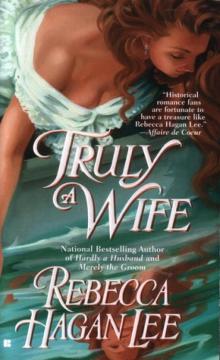 Truly a Wife
Truly a Wife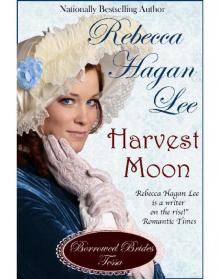 Harvest Moon
Harvest Moon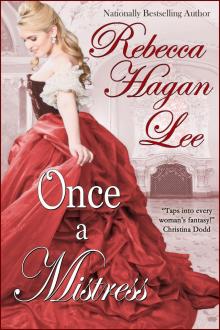 Once a Mistress
Once a Mistress Gossamer
Gossamer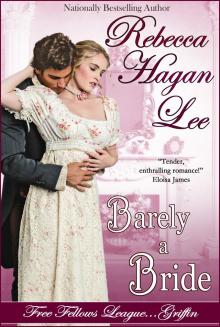 Barely a Bride
Barely a Bride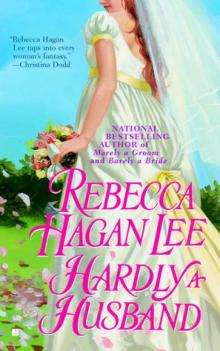 Hardly a Husband
Hardly a Husband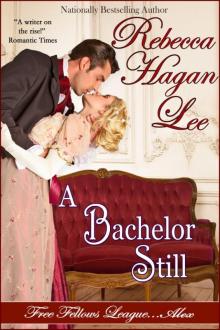 A Bachelor Still
A Bachelor Still A Wanted Man
A Wanted Man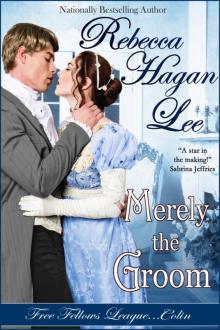 Merely the Groom
Merely the Groom Whisper Always
Whisper Always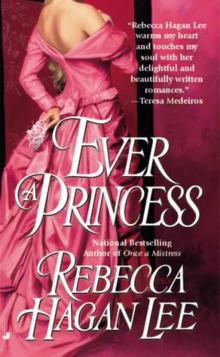 Ever a Princess
Ever a Princess A Hint of Heather
A Hint of Heather